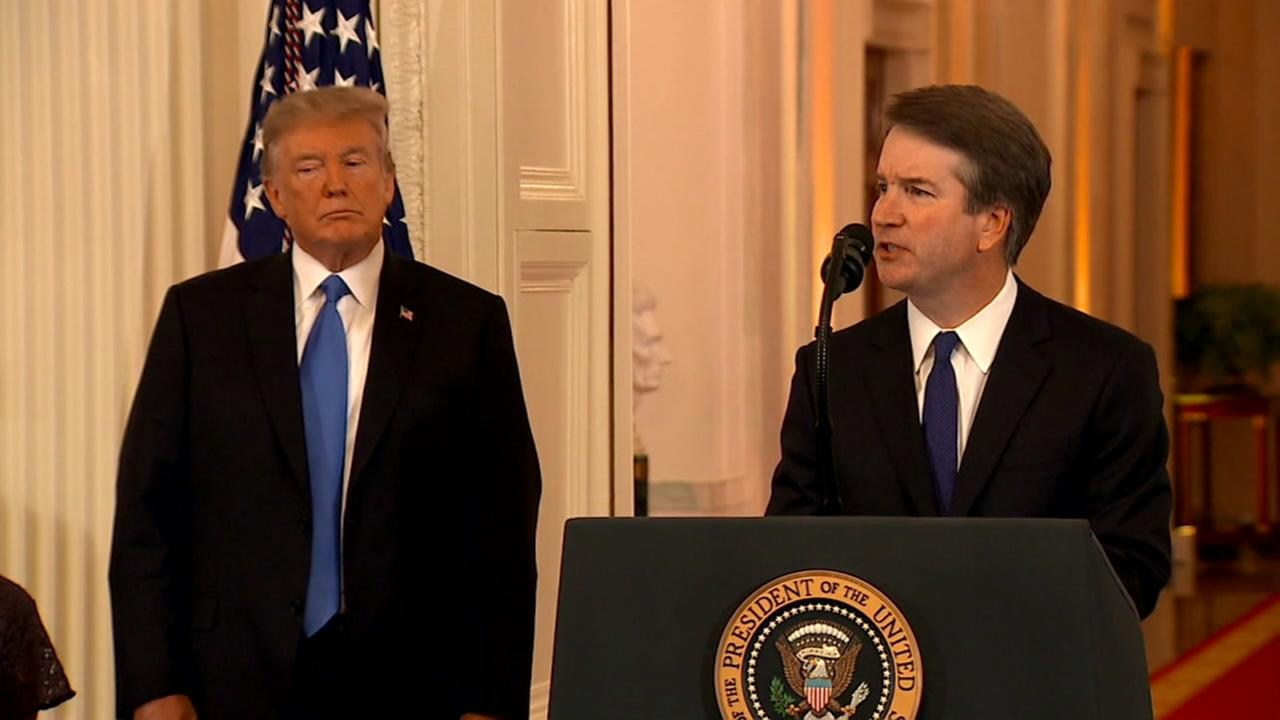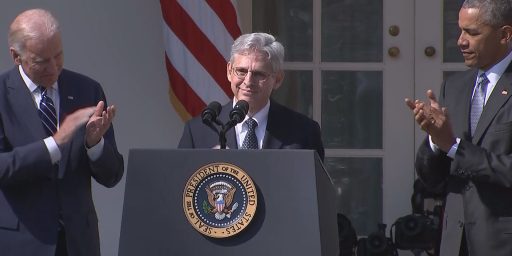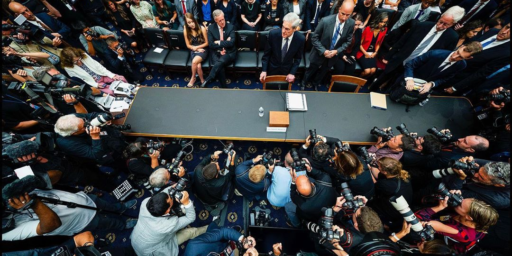Should Kavanaugh Confirmation Wait for the Midterms?
Tom Nichols argues it should. I disagree.

Naval War College professor Tom Nichols argues “Kavanaugh’s confirmation must wait.”
There is no way Republicans will halt their march toward Brett M. Kavanaugh’s confirmation as an associate justice of the Supreme Court. But if the party still cared about limited government and the rule of law, it would wait until after November to proceed.
I say this with deep reluctance. I was one of few Republicans who objected to the way Senate Majority Leader Mitch McConnell (R-Ky.) denied a hearing to Merrick Garland when he was nominated to the court by President Barack Obama, despite the fact that I consider myself a conservative — or what used to be called a conservative, before the age of Trump — and that I did not look forward to adding a justice appointed by a liberal Democrat.
But if Republicans cared about any principle they have ever defended before today, they would put Kavanaugh’s confirmation hearings on hold. The reason: We are now in the opening phase of a political crisis brought about by the guilty plea entered in federal court on Tuesday by the president’s former lawyer, Michael Cohen.
I would argue that we’ve been in a political crisis pretty much from Trump’s election, certainly his inauguration. There was enough reason to think that Trump was obstructing justice to appoint Robert Mueller as special counsel way back on May 17, 2017, less than four months into his presidency.
[W]e are now in political, not legal, territory. The question is whether the members of the U.S. Senate should confirm a nominee who could, sooner rather than later, be sitting in judgment of the same president who nominated him — even as a scandal with huge constitutional ramifications is unfolding in real time.
Trump is now in a position to place a justice on the court who could well end up deciding essential matters as they pertain to the rule of law and to the president personally. This requires a deliberate pause. And yet, the same Republicans who felt Obama had no business nominating a justice so close to an election — as though presidential terms end somewhere short of eight years, as long as the legislative majority says so — are now rushing to confirm a judge whose entire nomination now could represent a gigantic conflict of interest for their own president and party.
Neil Gorsuch, nominated and confirmed before the Mueller appointment, is already on the Court. Adding Kavanaugh would add another Justice with a conflict of interest. Under the precedent in United States v. Nixon, neither would be required to recuse themselves. (Three Nixon appointees—Chief Justice Warren Burger, Harry Blackmun, and Lewis Powell—participated in the decision. A fourth Nixon appointee, William Rehnquist, recused himself because he had previously served in the Nixon Justice Department.) But that case also demonstrated judicial integrity: all three Nixon appointees who participated ruled against Nixon.
So who, then, should decide when Kavanaugh gets a hearing? The answer, as always, should rest with the American people. We are remarkably close to an election, but even if Cohen’s plea deal had broken months ago, there would still be a strong argument for slowing the process. This is not an outcome Republicans should fear: they are likely to hold the Senate anyway, and perhaps putting the Kavanaugh nomination in abeyance for the moment might even help them with GOP voter turnout.
This strikes me as a bizarre compromise. We don’t live under a parliamentary system. We elect Presidents, Representatives, and Senators to fixed terms. The notion that Trump and the current Senate should punt a major decision until after the midterms to give voters a chance to weigh in is just odd; it’s not how things work in this country. Furthermore, if it were, only a third of the Senate comes up for a vote. The retention of the Senate by Republicans wouldn’t be a national mandate. And, for that matter, the Senate wouldn’t reflect the outcome of the November elections until a new Congress is convened in January.
Nor would it fix the underlying problem. A Kavanaugh confirmed by the post-midterm Senate would still face the same conflict of interest, partial referendum on his fate or no.
Beyond that, Tom’s plan essentially validates the Garland precedent. He and I both believe Presidents are entitled to carry out their full range of duties through the end of their term, barring impeachment.
We also might have at least some resolution to the Mueller investigation by November. Having the investigation complete before moving forward on almost any major initiative, let alone a Supreme Court nomination, would be ideal, but special counsel Robert S. Mueller III’s team should be allowed as much time as it needs and the government must continue and function in the meantime. Still, if there are more indictments — as seems likely — they will give the voters and the Congress that much more information before the election and before the lifetime appointment of a new justice.
Mueller is operating on his own timetable but there’s reason to believe very little will happen between now and the election. As Lawfare‘s Ben Wittes noted in the most recent episode of the “Rational Security” podcast, there’s a tradition for these special counsel/investigator/prosecutor investigations to lay low between Labor Day and Election Day to avoid influencing outcomes.
Even if he doesn’t follow that tradition—and some haven’t—we’re unlikely to know a whole lot more by November. Maybe we’d know more by January 3, when the new Congress convenes. But it’s unlikely the case will be resolved. Under Tom’s logic, then we really ought to wait until Mueller is done.
In any case, there is no way around the reality that there is now a credible accusation, on the record in a federal court, that the current president of the United States may have directed his lawyer to commit two felonies. There is too much here to simply proceed as though this were just another nomination. The voters deserve a chance to weigh in before the Senate rushes to place a justice on the court, one who will still be there decades after Trump is out of office.
The president is the president and commander in chief until Congress or the American people say he’s not. He maintains every power and perquisite of his office until that moment. He has every right to nominate a justice to the Supreme Court. But if the Senate cannot wait roughly 70 days to begin their deliberations, we ought to ask why Republicans feel it is imperative to rush Kavanaugh onto the court, and why, most of all, they will not trust in the judgment of the voters just two years after claiming that only the voters could speak on something as important as a Supreme Court nomination.
Again, if giving the voters a chance to weigh in solved anything, the operative date is January 3, so we’re now at more than 130 days. The new Supreme Court term will begin on October 1. We’d, therefore, go most of the next term with only eight Justices. Probably without having solved any underlying problem.
The only real logic here seems to be that, “Well, Senate Republicans applied a similar logic for Merrick Garland.” But, first, Tom and I bought thought it was outrageous. And, second, it arguably made more sense in the case of Garland, since the upcoming election then decided one hundred percent of the Presidency, the single official entrusted to appoint Justices, whereas the upcoming now only decides one third of the Senate, the body entrusted to provide a check.
I’m more sympathetic to Tom’s argument if we simply remove the midterms from the equation. It would be much more persuasive to argue that the Senate simply shouldn’t confirm a Trump appointee until Trump is cleared of the cloud that hangs over him or he’s impeached, in which case his successor would have a clean slate. But, given we have no idea how long that’ll take, that’s a hard sell.
I’m also sympathetic to the argument that, given Trump’s situation, Kavanaugh’s views on executive power are worrisome. But that’s an argument for rejecting Kavanaugh outright, not punting to November.





James- There is no matter of principle here. This is all just straight power politics. If you have the votes, you can deny someone a hearing for as long as you want. If you do have the votes you go ahead and confirm anyone you want. Garland set a new norm. The party out of power no longer has a say.
Steve
People like to talk of slippery slopes. After years of watching Republicans game the system, I feel that we’ve tumbled to the bottom. I’m ready to see Democrats take off the gloves, slip on the brass knuckles, and start advancing any argument that might advance their agenda.
@Steve: Sure. Tom acknowledges in his first paragraph that Senate Republicans are unlikely to follow his advice. He’s making a normative argument, not a prediction.
Yes. But would you actually argue this or do you think it’s basically OK if Trump gets to nominate another Supreme Court judge?
I might be mistaken, but your piece reads like a plea to simply accept the existing power structure, no matter how (i.e, through cheating) that power structure came to be.
I don’t think it is wise to simply disregard the underlying principles, if perhaps not the explicit rules, of a well-functioning democracy.
@drj:
I would vote to impeach and remove him from office for manifold acts of public corruption, including repeated and daily violations of the Emoluments Clause.
Given that there’s no serious move to impeach him, however, I’m not sure there’s a strong argument for denying him the right to exercise the powers he’s been elected to wield. He’s either President or he isn’t.
The political principle the GOP will follow is “get it while the getting is good.”
@James Joyner:
It’s not a question of his legal status. It’s a question of whether one’s behavior to obtain office or during it makes one fit to still hold it. The reason the Founders didn’t put more stringent requirements on removal from office was because they still held to the notion of honor – that is, that someone like Trump wouldn’t have gotten within miles of the WH because they assumed no one would vote for such a scoundrel and the Office wasn’t meant to be as prominent as it is. Think about it: they just fought a war to escape a nation run by a greedy, incompetent man with questionable sanity everyone had to obey and his cronies. WHY wouldn’t they have put measures in place to prevent such a man from rising in their new nation? Notice there’s nothing written that prevents someone they’d consider a “lunatic” (today’s mentally ill) from gaining power – there was a foundational assumption such a person wouldn’t be accepted so there was no need to regulate it. The Founders trusted the public to select people of extraordinary character for a difficult job. We’re having this conversation because it didn’t occur to them that morons would choose a dirty moron and that would affect everyone’s lives for decades.
Besides, Obama was President and denied his right to exercise the powers he’s been elected to wield over something far less serious and it clearly wasn’t a problem for them two years ago. Shoving Kavanaugh through is definitely going to piss off a lot of people and make the Blue Wave stronger. Trump will get his nominee as is his right as President but nobody said it had to be swift, sure or right before the shit hits the fan for him.
@KM:
Obama was not denied anything. The Constitution gave him the power to name a nominee to replace Scalia and he exercised that authority. As I noted at the time, though, the Constitution does not require the Senate to actually act on that nomination.
@James Joyner:
But:
a) he shouldn’t be (as you agree);
b) Congressional Republicans refuse to play the part that the Founders envisioned for them in situations like these.
In other words, the system is broken. Foundational principles are no longer being followed.
I’d argue that if we can no longer rely on the normal rules (for instance, if we have an unidicted co-conspirator in the White House who won his election with the help of a foreign adversary), we shouldn’t blindly accept and follow the normal rules.
At the very least, that would mean that one could quite reasonably argue that Trump shouldn’t get to nominate another SC justice as if nothing out of the ordinary is going on.
@Doug Mataconis :
And Trump has named his. As you’ve pointed out, it’s not required it be acted on, especially not on a political deadline as set by the nominator. So what’s all the hubbub about waiting till after the election about then other then bitching their own newly-created biased standard is being applied to them? If waiting a year till a new election and individual is a sufficient period of time, why is a month too damn long, especially seeing as how he’ll probably be confirmed anyways unlike the other guy?
@KM:
If you think you can persuade a majority of the Senate to wait to act on the nomination, then you are free to try to do so.
My point is that there is no legal or normative requirement that they do so.
Confirm NOW! Does anyone really not know why the Left would like to wait?
@Doug Mataconis:
Based on precedent, I’d say there is (or rather was) a normative requirement that they do so.
From law professors Robin Bradley Kar’s and Jason Mazzone’s essay The Garland Affair:
@drj:
History does not equal morality. The Senate is not required to give a Presidential nominee a hearing or a vote. And, in the end, that’s really all that mattered.
@James Joyner:
I totally agree that the guy who’s on his front lawn beating up his wife every Saturday night should be arrested, convicted, and sent to jail, but until he’s actually a convicted felon, of course he should be allowed to buy as many guns as he desires.
I am all in with James on this one. This call belongs to the current Senate and they will do what they will do. The options are to lobby them to wait (go for it!), attack them rhetorically and further erode the process, or engage in some kind of violent constitutional uprising, which is unlikely to accomplish anything good (and no one is going there over Kavanaugh in particular or Trump in general).
Part of my problem with all this hand wringing over Kavanaugh and Trump is the idea that either Trump – if he survives – or Pence – if Trump does not survive – is going to bring anyone more acceptable to mainstream America if Kavanaugh is defeated. The problem is the problem because elections have consequences.
@Doug Mataconis:
Also, if you think there’s no way you’ll lose the next election, you can just run out the clock and get President Clinton II to fix it later.
@Doug Mataconis:
Might makes right, got it.
If/when RBG needs to step down and Trump has a Dem majority to deal with, remember – in the end that’s all the really matters. He doesn’t deserve a hearing or a vote. Play these games now and pay the reaper later. He’s got two more years and at least one more potential spot to deal with – not to mention everyone he picks has a bad habit of ending up in jail for being dirty AF. This WILL bite them in the ass but hey, the Constitution never said you have to play nice!
I disagree that the Senate doesn’t have to hold hearings or a vote when a president nominates an official or a Supreme Court Justice. But it doesn’t matter.
The hard fact is the party in power will do whatever it can get away with. This has always been so, except in the past there was a willingness to compromise with the other party from time to time. That’s mostly gone now.
The actions by the democrats to stop Kavanaugh are akin to those of the Republicans to stop Obamacare. The Republicans had a better chance of doing so, but they still failed.
I’d say it would be worth stalling Kavanaugh if the democrats had a good chance of taking the Senate. But if they did, the GOP would rush that much faster to confirm him.
As with Garland, unless you get a large portion of the public, Democrats, Republicans and Independents, riled up about it, things will go as the GOP wants.
@Kathy:
Exactly! Politics ain’t beanbag.
“It’s a question of whether one’s behavior to obtain office or during it makes one fit to still hold it.” Trump was never fit to hold office even before he started running. The problem is with the electorate that either voted him in or failed to stop idiots from making that mistake. It would have been nice if the Democratic candidate had been a better campaigner, but she wasn’t, the base knew it, and they voted for her anyway. The GOP knew that they had plenty of credible build the wall, tax breaks for the rich candidates to select from and chose a foul-mouthed carny barker.
There are enough own goals from 2016 to make further own goals unnecessary for the entire future of soccer. Laissez les bons temps rouller.
“we shouldn’t blindly accept and follow the normal rules.”
Which is why that great patriot, Glenn Beck, has been stumping for a new Constitution for about 3 or 4 years. Will you be signing up to join that quest? The other alternative is Huey and Angela’s, burn the suckah down. For citizens, The Constitution doesn’t offer alternate choices.
@MikeyParks: Are you REALLY that unsure about the future of the GOP? Good to know! And comforting, I would add.
One of the few things that rings true to the “both sides do it” is that both parties block the nomination of qualified nominees for the Federal Courts close to elections when they have the majority in the Senate but don’t hold the White House.
But that’s a horrible precedent. In the end you are going to have a Federal Court stacked by people appointed and confirmed by people in the same party, and they are going to be predictable and mediocre jurists.
Maybe somekind of Constitutional Amendment is warranted here.
“t both parties block the nomination of qualified nominees for the Federal Courts close to elections when they have the majority in the Senate but don’t hold the White House.”
Maybe, but remember what got us to the point where you no longer needed 60 Senate votes to confirm is that in the first 5 years of the Obama presidency McConnell blocked more nominations than had been blocked in our entire history. Ultimately, a brilliant move by McConnell. He held open judge spots for the GOP and then was able to confirm whoever the party wanted after 2016. Not sure the Dems really had much choice though. I told like McConnell was willing to hold off on hearings for years so the Dems at least got some nominations in.
Steve
@Just nutha ignint cracker:
The Constitution isn’t the only set of rules that governs political practice.
For instance, under normal circumstances I’d argue that court packing is a big no.
But what if, for example, it turns out that Trump committed a bevy of campaign finance violations (which he did) and actively colluded with Russian intelligence to swing the election his way (which is all but certain)? I’d at least consider court packing as a serious options if his nominees refuse to step down.
In order for a democracy to keep functioning, serious cheating simply has to be punished somehow. Democracies that reward cheating don’t last.
Court packing isn’t unconstitutional, by the way.
I don’t think, James, you really disagree with Nichols. His argument depends on an absurd predicate,
It is essential that our politicians and our government operate on norms as well as laws. But politicians being the careerist asshats they are, that will only happen if voters enforce the norms, which is to say their careerist asshat opponents can successfully campaign on their violations of norms. We are so polarized it’s hard to make this work, but Dems should actually try. They should be running on the threat Kavanaugh, and Gorsuch, present to health care, reproductive rights, and dealing with Trump.
@KM:
Well, most of the world will say that’s the American way. Its how the United States was formed, how it got control of half a continent, its how much of its early economy was subsidized by slave labor, its how its gotten its way over much of the globe since WW2 (including starting a few completely immoral wars).
Seriously, look at American history, both at home and around the world. ‘Might makes right’ is one of the principles that stands out. People are upset that its playing a role in party politics, but why should that be the exception?
@KM:
Sure. But the onus is then on the Congress to remove him from office. Were there a Republican House and a Democratic Senate, I could see the argument for denying him the effective use of his powers given partisan recalcitrance. But we now have Republicans in control of both Houses.
@Han:
I don’t see the usefulness of the analogy, given that the same authorities presumably have the power to arrest him. Were Trump currently the subject of impeachment hearings, I’d say the Senate should indeed halt action on things like SCOTUS confirmations.
@gVOR08:
Perhaps. It makes sense to me only if Tom thinks impeachment is imminent. But he seems to discount that.
The hearings should wait until all the documents relating to Kavanaugh’s work in the Bush administration can be released to the senate, at the very least.
But they won’t.
@steve:
It got really bad after Newt Gingrich became speaker in 1995, but to me there is a necessity of a constitutional provision forcing the Senate to vote on judicial nominations. At least to have a up and down vote, not a vote on cloture.
@James Joyner:
Not to remotely try to find positives in the death of an honorable man, but McCain has been pretty clear that he isn’t going to resign, and it’s likely that he will be unable to participate in this process. That brings the Senate to a 50/49 split. Assuming Democrats hold firm, and they should do so, one defection would derail Kavanaugh’s nomination. Remember that Pence only gets a vote in the event of a tie.